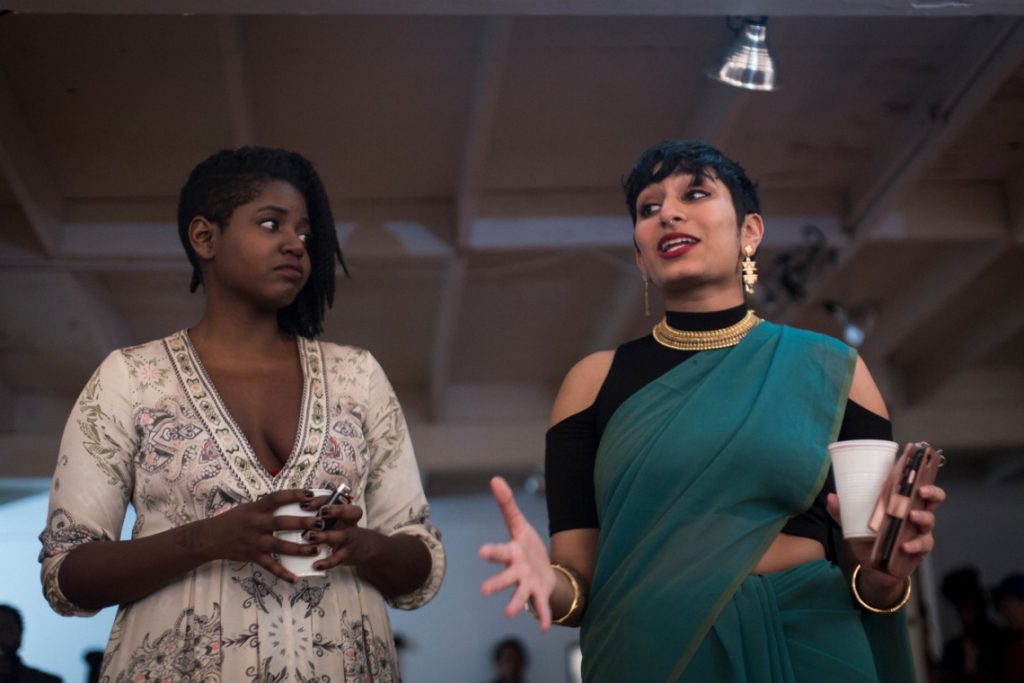
How “Brown Girls” Helps Us Better Understand Identity
By Christian Sanchez, Marlena Wadley and Tanya Munoz
photos via RJ Eldridge
On Wednesday (February 15), Chicago Art Department hummed with chatter and laughter while people lined up outside waiting for the premiere of the web series Brown Girls. Written by Fatimah Asghar and directed by Sam Bailey, Brown Girls is a story based on Asghar’s life. Centered around two brown women, Leila and Patricia are trying to settle into their identities and careers while being each other’s shoulder and combing out the kinks.
Asghar is no stranger to writing or performing; in 2015, she published her own book, AFTER, a number of poems that truthfully explore the aftermath of an abusive relationship. In 2015 she also delivered a TED talk, “We Own All The Language In The World” about poetry being a powerful tool, helping us see our world differently. If she’s not spreading truth on a large platform, she’s doing it in smaller, intimate spaces in her community. A teaching artist at Young Chicago Authors, Asghar also helps run the space’s queer youth open mic

When the announcement of Brown Girls first surfaced, many compared it to Lena Dunham’s TV show Girls. But really, Brown Girls is unmatched. The show is inclusive and representative of intersectional
Before the premiere of Brown Girls, various WOC — dancers, singers, comedians, and storytellers — showcased what it means to be a brown woman in today’s society. Among the performers was Brown Girls star Nabila Hossain, who paid tribute to her South Asian roots using dance; Sonia Denis, who uses comedic storytelling to relay her experiences as a black woman; and theme song contributors Jamila Woods and Lisa Mishra, who enchanted us with their majestic voices.
The premiere party was a handful of avant-garde performances that exemplified each artist’s uniqueness and the overall creativity of brown women in general. The entire night, POC walked through the

Ryan and Sydney—who came together to the event—shared many reasons why they were present at the screening. They had been waiting for the show to premiere and were excited to participate in the shared experience of watching it for the first time with the crowd.
Ryan mentioned that they didn’t often get to interact with queer brown people, and that was one of the main reasons that Brown Girls appealed to them. Sydney shared that their favorite part of the trailer was the intimacy and ease of the humor. “It’s funny but doesn’t try too hard,” she said. Ryan added the fact that Woods worked on the music also made them excited for the show.
Many people at the event had been fans and supporters of Asghar before she had even announced the idea of Brown Girls.
One of the first scenes from the show was a frame of a queer, Afro-Latina woman laying naked, on her boo’s bed. The entire crowd squealed, whistled, clapped, and cheered with delight. Finally, representation. There was something about hearing the words, “You gotta stop eating dirty butt,” with a room full of people who identified with that line, that made everything feel comforting.
Everyone in the room seemed to understand each other, where each other came from, our struggles as POC and being queer; it felt like all of us were supposed to be there, and that we belonged there, together. During one of the last episodes, one of the characters, whose name is Victor — played by Rashaad Hall — admits, “I